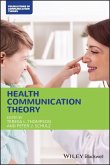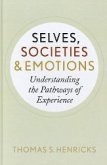- Broschiertes Buch
- Merkliste
- Auf die Merkliste
- Bewerten Bewerten
- Teilen
- Produkt teilen
- Produkterinnerung
- Produkterinnerung
Health and the Sociology of Emotions offers an appraisal of the current lively debates which challenge the contribution of the sociology of emotion to health, and of sociology of health and illness to a sociological understanding of emotion.
Andere Kunden interessierten sich auch für
![Europe Europe]() De BeerEurope93,99 €
De BeerEurope93,99 €![Sustainability and the City Sustainability and the City]() Sustainability and the City135,99 €
Sustainability and the City135,99 €![The Rise of the Network Society The Rise of the Network Society]() Manuel CastellsThe Rise of the Network Society43,99 €
Manuel CastellsThe Rise of the Network Society43,99 €![How Games Move Us How Games Move Us]() Katherine IsbisterHow Games Move Us25,99 €
Katherine IsbisterHow Games Move Us25,99 €![Health Communication Theory Health Communication Theory]() Health Communication Theory48,99 €
Health Communication Theory48,99 €![Safer Spaces, Feminist Movements and Emotions Safer Spaces, Feminist Movements and Emotions]() Giada Bonu RosenkranzSafer Spaces, Feminist Movements and Emotions179,99 €
Giada Bonu RosenkranzSafer Spaces, Feminist Movements and Emotions179,99 €![Selves, Societies, and Emotions Selves, Societies, and Emotions]() Thomas S. HenricksSelves, Societies, and Emotions166,99 €
Thomas S. HenricksSelves, Societies, and Emotions166,99 €-
-
Health and the Sociology of Emotions offers an appraisal of the current lively debates which challenge the contribution of the sociology of emotion to health, and of sociology of health and illness to a sociological understanding of emotion.
Produktdetails
- Produktdetails
- Verlag: John Wiley & Sons
- Seitenzahl: 216
- Erscheinungstermin: 20. Januar 1997
- Englisch
- Abmessung: 229mm x 152mm x 12mm
- Gewicht: 321g
- ISBN-13: 9780631203513
- ISBN-10: 0631203516
- Artikelnr.: 24345664
- Herstellerkennzeichnung
- Libri GmbH
- Europaallee 1
- 36244 Bad Hersfeld
- gpsr@libri.de
- Verlag: John Wiley & Sons
- Seitenzahl: 216
- Erscheinungstermin: 20. Januar 1997
- Englisch
- Abmessung: 229mm x 152mm x 12mm
- Gewicht: 321g
- ISBN-13: 9780631203513
- ISBN-10: 0631203516
- Artikelnr.: 24345664
- Herstellerkennzeichnung
- Libri GmbH
- Europaallee 1
- 36244 Bad Hersfeld
- gpsr@libri.de
Jessa James a grandi sur la Cote Est des États-Unis, mais a toujours souffert d'une terrible envie de voyager. Elle a vécu dans six états différents, a connu de nombreux métiers, mais est toujours revenue à son premier amour - l'écriture. Jessa travaille à temps plein comme écrivaine, mange beaucoup trop de chocolat noir, à une addiction aux Cheetos et au café frappé, et ne peut jamais se lasser des mâles alpha sexy qui savent exactement ce qu'ils veulent - et qui n'ont pas peur de le dire. Les coups de foudre avec des mâles alpha dominants restent son genre favori de nouvelles à lire (et à écrire).
Introduction (Veronica James, University of Nottingham; and Jonathan Gabe,
Royal Holloway, University of London).
Theoretical Issues.
1. Biomedicine, holistic health and the emotionally reflexive body in
"late" modernity (Gillian Bendelow and Simon Williams, University of
Warwick).
2. C. Wright Mills meets Prozac: the social emotions approach to an
understanding of health and illness (Margot Lyon, Australian National
University, Canberra).
Methodology.
3. Plans, intentions and emotions: reflections on a methodological problem
encountered in a study of teenage pregnancy (Andrew Finlay, Dorothy
Whittington, Nicola Shaw and Monica McWilliams, Universities of Dublin and
Ulster; Northern Health and Social Service Board).
4. Is there a reciprocal relationship between emotions as expressed in
first person fieldwork accounts and the sociology of emotion? (Liz Young
and Ray Lee, Royal Holloway, University of London).
Social Construction.
5. Emotional labour, order and emotional power in care assistant work
(Geraldine Lee-Treweek, University of Manchester).
6. Social construction of emotion and health promotion: the case of nursing
(Pam Smith and Abigail Masterson, RCN Institute of Advanced Nursing
Education).
7. Trust, uncertainty and consumerist models of health care delivery
(Deborah Lupton, University of Western Sydney).
8. Exploring emotional expression in medical examinations: a
transcript-based analysis (Bill Yoels, University of Alabama at
Birmingham).
Royal Holloway, University of London).
Theoretical Issues.
1. Biomedicine, holistic health and the emotionally reflexive body in
"late" modernity (Gillian Bendelow and Simon Williams, University of
Warwick).
2. C. Wright Mills meets Prozac: the social emotions approach to an
understanding of health and illness (Margot Lyon, Australian National
University, Canberra).
Methodology.
3. Plans, intentions and emotions: reflections on a methodological problem
encountered in a study of teenage pregnancy (Andrew Finlay, Dorothy
Whittington, Nicola Shaw and Monica McWilliams, Universities of Dublin and
Ulster; Northern Health and Social Service Board).
4. Is there a reciprocal relationship between emotions as expressed in
first person fieldwork accounts and the sociology of emotion? (Liz Young
and Ray Lee, Royal Holloway, University of London).
Social Construction.
5. Emotional labour, order and emotional power in care assistant work
(Geraldine Lee-Treweek, University of Manchester).
6. Social construction of emotion and health promotion: the case of nursing
(Pam Smith and Abigail Masterson, RCN Institute of Advanced Nursing
Education).
7. Trust, uncertainty and consumerist models of health care delivery
(Deborah Lupton, University of Western Sydney).
8. Exploring emotional expression in medical examinations: a
transcript-based analysis (Bill Yoels, University of Alabama at
Birmingham).
Introduction (Veronica James, University of Nottingham; and Jonathan Gabe,
Royal Holloway, University of London).
Theoretical Issues.
1. Biomedicine, holistic health and the emotionally reflexive body in
"late" modernity (Gillian Bendelow and Simon Williams, University of
Warwick).
2. C. Wright Mills meets Prozac: the social emotions approach to an
understanding of health and illness (Margot Lyon, Australian National
University, Canberra).
Methodology.
3. Plans, intentions and emotions: reflections on a methodological problem
encountered in a study of teenage pregnancy (Andrew Finlay, Dorothy
Whittington, Nicola Shaw and Monica McWilliams, Universities of Dublin and
Ulster; Northern Health and Social Service Board).
4. Is there a reciprocal relationship between emotions as expressed in
first person fieldwork accounts and the sociology of emotion? (Liz Young
and Ray Lee, Royal Holloway, University of London).
Social Construction.
5. Emotional labour, order and emotional power in care assistant work
(Geraldine Lee-Treweek, University of Manchester).
6. Social construction of emotion and health promotion: the case of nursing
(Pam Smith and Abigail Masterson, RCN Institute of Advanced Nursing
Education).
7. Trust, uncertainty and consumerist models of health care delivery
(Deborah Lupton, University of Western Sydney).
8. Exploring emotional expression in medical examinations: a
transcript-based analysis (Bill Yoels, University of Alabama at
Birmingham).
Royal Holloway, University of London).
Theoretical Issues.
1. Biomedicine, holistic health and the emotionally reflexive body in
"late" modernity (Gillian Bendelow and Simon Williams, University of
Warwick).
2. C. Wright Mills meets Prozac: the social emotions approach to an
understanding of health and illness (Margot Lyon, Australian National
University, Canberra).
Methodology.
3. Plans, intentions and emotions: reflections on a methodological problem
encountered in a study of teenage pregnancy (Andrew Finlay, Dorothy
Whittington, Nicola Shaw and Monica McWilliams, Universities of Dublin and
Ulster; Northern Health and Social Service Board).
4. Is there a reciprocal relationship between emotions as expressed in
first person fieldwork accounts and the sociology of emotion? (Liz Young
and Ray Lee, Royal Holloway, University of London).
Social Construction.
5. Emotional labour, order and emotional power in care assistant work
(Geraldine Lee-Treweek, University of Manchester).
6. Social construction of emotion and health promotion: the case of nursing
(Pam Smith and Abigail Masterson, RCN Institute of Advanced Nursing
Education).
7. Trust, uncertainty and consumerist models of health care delivery
(Deborah Lupton, University of Western Sydney).
8. Exploring emotional expression in medical examinations: a
transcript-based analysis (Bill Yoels, University of Alabama at
Birmingham).









